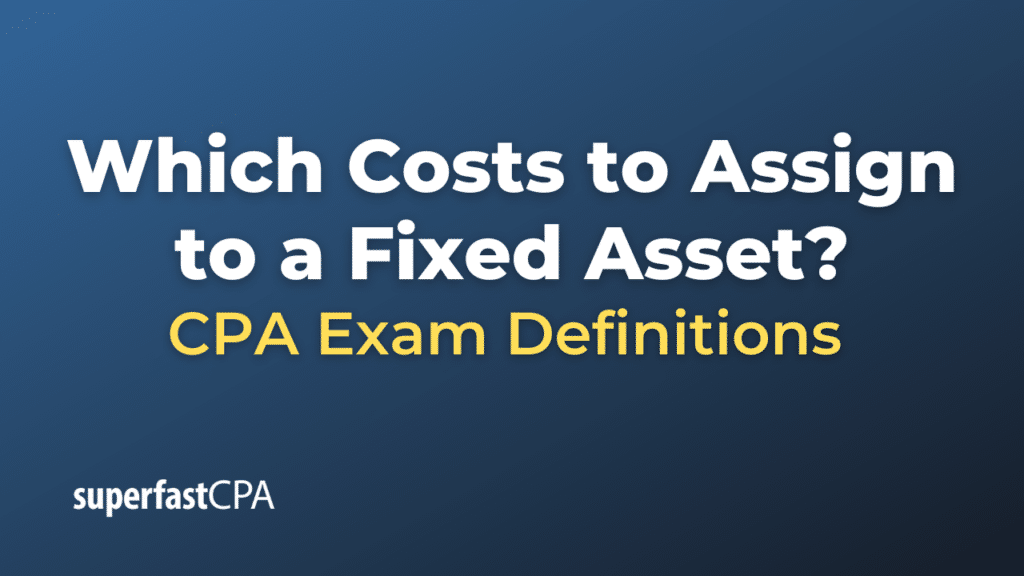Which Costs to Assign to a Fixed Asset
In accounting, assigning costs to a fixed asset (also known as capitalizing costs) involves identifying all the expenditures that are directly attributable to bringing the asset to its intended use. These costs are then added to the asset’s value on the balance sheet and depreciated over the asset’s useful life. The specific types of costs that can be capitalized vary depending on the asset and its nature, but generally, they can include the following:
Purchase Price
The initial purchase price of the asset, less any discounts, is the starting point for capitalization.
Installation Costs
These include costs incurred to get the asset into its operational state. This could include costs for wiring, plumbing, base support, or any other costs directly associated with installing the asset.
Freight and Shipping
Any costs incurred to bring the asset from the seller to its new location can be capitalized.
Sales Taxes, Import Duties, and Other Levies
These are often part of the asset’s purchase price and are typically capitalized.
Professional Fees
Costs such as legal fees, installation consultation, or engineering studies directly related to the asset can be capitalized.
Site Preparation Costs
This includes any costs associated with preparing a location for the new asset, such as leveling floors, installing specialized electrical outlets, etc.
Testing and Pre-operational Costs
Any costs incurred during the testing phase to ensure the asset is functioning as intended can usually be capitalized. However, costs related to inefficiencies during the initial period of operation are generally expensed.
Improvements and Upgrades
If a fixed asset is improved in a way that extends its useful life, increases its capacity, or improves its quality, then those costs can also be capitalized and depreciated over the new useful life.
Borrowing Costs
In some cases, interest expenses related to the financing of a significant asset’s purchase and installation can be capitalized until the asset is ready for its intended use. This is more common in large, long-term construction projects.
Direct Labor and Materials
In a self-constructed asset, the costs of materials and direct labor involved in the construction can be capitalized.
Software Costs
For internally developed software, certain development costs may also be capitalized once technological feasibility is established.
Example of Which Costs to Assign to a Fixed Asset
Here’s a fictional example to illustrate the types of costs that could be assigned to a fixed asset.
“TechCo Solutions” is a small technology company that purchases a server to handle its increasing computing needs. Below are the various costs associated with bringing the server into operational use:
- Purchase Price of Server: $25,000
- Shipping and Handling: $500
- Sales Tax: $2,000
- Installation and Setup Fees: $1,200
- Consultant Fees for Configuration: $1,500
- Initial Software Licenses: $800
- Testing Costs: $400
Accounting Treatment
To properly account for the server as a fixed asset, TechCo Solutions would sum up all these costs to arrive at the capitalized cost of the server.
Here’s how:
- Purchase Price: $25,000
- Shipping and Handling: $500
- Sales Tax: $2,000
- Installation and Setup: $1,200
- Consultant Fees for Configuration: $1,500
- Initial Software Licenses: $800
- Testing Costs: $400
Total Capitalized Cost of Server: $25,000 (Purchase Price) + $500 (Shipping) + $2,000 (Tax) + $1,200 (Installation) + $1,500 (Consultant Fees) + $800 (Software Licenses) + $400 (Testing) = $31,400
In this example, TechCo Solutions would record the server as a fixed asset on its balance sheet at a value of $31,400. Going forward, the company would depreciate this value over the server’s useful life, as per the applicable accounting standards and tax regulations.
Remember, this is a simplified example, and the actual accounting can be more complicated. It’s always best to consult with a financial advisor or an accountant for specific accounting treatments.













